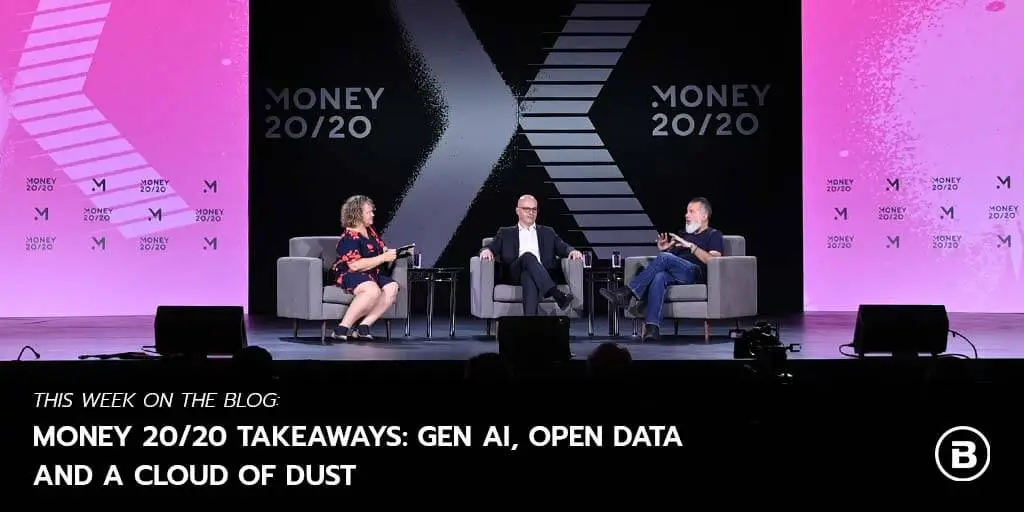Keep pace with the rapidly evolving fintech industry by subscribing to the BIGcast Network. Get weekly insights from industry leaders John Best and Glen Sarvady, delivered straight to your preferred podcast platform. Join our community and stay informed about the latest trends shaping the credit union industry. Subscribe today and ensure you’re always ahead of the curve.

Money 20/20 Takeaways: Gen AI, Open Data and a Cloud of Dust
To the surprise of absolutely no one, Generative AI was the marquee attraction at this year’s Money 20/20 conference. The events team did its usual stellar job bringing key names to the podium- sector leaders Open AI, Nvidia, and Anthropic were well represented at the executive and panel level, sharing perspectives that haven’t yet become table stakes on the conference circuit. Nvidia in particular made a mark by establishing its own neighborhood on the exhibit hall floor, allocating space to fintechs displaying use cases for their chip technology.
At the same time, this year’s speakers seemed to exhibit a welcome dose of self-awareness. Perhaps mindful of the aftermath of 2020’s Bitcoin lovefest, many were keen to balance their AI enthusiasm with a reality check. And AI was far from the only topic on the table; the lines between themes like data sharing, regulation and consumer control tended to blur, as they should.
Our Money 20/20 podcasts have covered digital wallets (an interview with Paze), consumer monetization of the data they generate (DrumWave), and a pair of impressive startups (Footprint and Eisen, one in each of the above episodes). We’ve also dug into the CFPB’s new personal data rights rule. Here are some remaining key takeaways from the conference.
Transformational? Overhyped? Yes.
New York Stock Exchange President Lynne Martin set the tone for much of the AI positioning in Money 20/20’s opening session, pointing out that the NYSE has been using AI for ten years (“We process 750 billion messages daily- machine learning is imperative.”)
According to SEC Chairman Gary Gensler more than 50 million Americans are now using robo advisors, which he sees as an effective tool to drive down the cost to support an underserved segment while subject to existing regulations. On the other hand Gensler cautioned against “AI washing,” namedropping AI merely for promotional gain- a practice he notes has exploded in Fortune 500 press releases. Former Chief Economic Advisor Gary Cohn (now IBM’s Vice Chairman) estimated that “less than 10% of CEOs can tell you something tangible they’re doing with AI.”
My favorite quote on the topic came from Databricks Co-Founder Arsalan Shiraji. “Is Generative AI transformational, or overhyped? Yes.” He added that “we’re still in the era of the human in the loop,” with the fast-moving technology already providing value but still requiring a chaperone.
Rigged Systems in the Eyes of the Beholder
The CFPB’s issued its long-awaited Section 1033 personal data rights rule the week leading up to Money 20/20. CFPB Director Rohit Chopra was refreshingly candid in his unscripted remarks during a fireside chat. That doesn’t mean his message was pleasant, however.
Chopra continued to frame the open banking debate in us/them terms (“We need to make sure our financial system is more like an open internet and not a small clubhouse”). Regarding the agency’s delay in recognizing a data exchange standard- a request highlighted by industry groups as a necessary ingredient for progress- he countered “We need to kick the tires to make sure the standard setting organizations aren’t rigged in favor of certain players.” I found Chopra’s use of the word “rigged” telling.
Brian Kelly, better known to credit card rewards junkies as The Points Guy, pointed his message at a different target. Kelly is hyper-focused on derailing the Credit Card Competition Act, which in broad terms threatens to do to credit card interchange what the Durbin Amendment did to debit. It’s currently a tug of war being waged between issuers and merchants, the latter holding a solid advantage in lobbying/influence. The Points Guy looks to engage the consumer to even the scales.
As Kelly points out, “Consumers don’t have a choice of which network they use” to route a transaction. “Airlines make profits on co-branded cards; if those go away, how do you think they’ll make it up?” he asks rhetorically. The CCCA poses an existential threat to The Points Guy’s business model, but Kelly’s objections have merit nonetheless.
With news of an apparent Republican sweep of the White House and both Congressional chambers breaking after Money 20/20’s conclusion, the regulatory outlook has shifted already. But the well-informed observations and conversations will continue to drive fintech’s trajectory.
